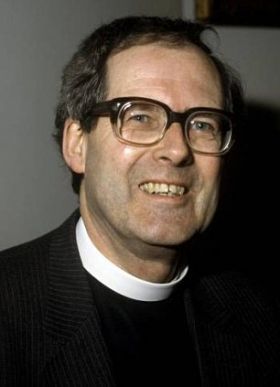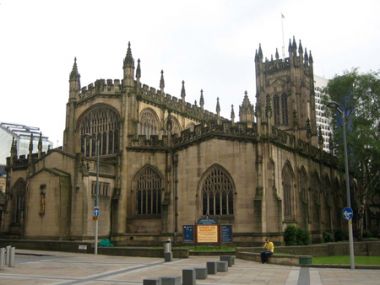Abusive priest 'avoided prosecution because of failure to act on allegations'

A senior Church of England priest who was deeply sexually and emotionally abusive to young boys escaped prosecution when he was alive, possibly because of a failure to act against him when the first complaints were made, according to a report today.
The Archbishop of York Dr John Sentamu said it was a matter of "shame" and "deep repentance" that the abuse had occurred. The inquiry by Judge Sally Cahill QC found that the former Archbishop of York, Lord Hope of Thornes, did not act on information he was given about abuse by Robert Waddington, former Dean of Manchester, who is now dead.
The 125-page report makes chilling reading and illustrates how a respected churchman could at the same time groom the young boys he had access to while cultivating an illusion of goodness in front of almost everyone else.
Throughout his long career as a paedophile, during which senior clergy praised him as someone with "a special gift with boys", children were abused in Australia, where Waddington also worked, and in England. He would treat his chosen boys like young adults and give them the pet name of "mon petit". There were also reports of boys being taken away by him on holiday, and of "boys frolicking with little clothing on."
Judge Cahill concludes that it is a "possibility" that Waddington might have faced prosecution had any investigation been made into allegations against him in 1999, 2003 or 2004. The last victim identified was in the 1990s but as late as 1999, when the first complaint was made to Lord Hope, Waddington had access to the choirboys' cloakroom at York Minster.
Waddington, born in 1927, graduated from Selwyn, Cambridge in 1951. His first curacy was in Bethnal Green between 1953 and 1955 and one victim says he was abused then. He left his curacy a year earlier than planned to work in Australia as chaplain at the Slade School in Queensland. He returned briefly to Cambridge in 1959 and then in 1961 returned to Australia as headmaster of St Barnabas School in Ravenshoe, Queensland. Two victims say they were abused in the following ten years. Waddington returned to England where he was appointed general secretary of the Church of England's board of education, and then Dean of Manchester in 1984 before retiring to York. Two further victims say they were abused in Manchester and York.

The report reveals that Waddington was popular with the choristers at Manchester Cathedral because of his use of language that was "shocking, unexpected and lavatorial." The report says: "It endeared him to and ingratiated him with some of the young choristers who could not believe 'the Dean' would speak in such a way." He could also be cheerful and elated one day, and morose the next.
The former Bishop of Manchester, Nigel McCulloch, told the inquiry that he regretted not querying the "appropriateness" of his Archbishop's decision not to involve the police after one of the victims made a complaint. He was aware that Lord Hope had chaired the discussions leading to the Church's child protection policy and so assumed he was aware of what the policies were. He also believed Lord Hope's statement that Waddington was by then a very ill man. "He therefore trusted the judgement of Lord Hope, whom he respected, trusted and to whom he had made an oath of obedience."
Judge Cahill says in the report: "Our conclusion, having heard his [Lord Hope's] evidence is that his concern for the welfare of Robert Waddington seems to have been paramount in his response to these allegations."
One victim in Australia wrote: "It should be acknowledged that this man is a criminal who caused the destruction of many young men's lives."
Another victim, Eli Ward, who has waived his right to anonymity, said his abuser was a "very clever guy". Speaking to BBC News, he said: "It would progress to picking me up, go to his house, stay over and then stay in his room and so on. Over a period of time, little by little, very strategic planning, very clever guy, peeling away his victim...not just an opportunity - take it, it's very much insidious, planning and grooming, very clever."
He added: "I want no other child, person, to go through what I have gone through. I have been through the full range of emotions - that's terrible, disgraceful. I should have been enjoying life, getting on with it - my abuse has stopped me doing that."
In a statement, Lord Hope, who before moving to York was Bishop of London, said he had maintained throughout his career that any allegation of abuse made against anyone connected to the Church must be dealt with professionally and swiftly.
"Accordingly, as someone who has always taken safeguarding extremely seriously, I am obviously disappointed that this inquiry has raised concerns about how the two cases in question were dealt with during my time at Bishopthorpe."
He said that such allegations as were reported to him were unspecific. "Indeed the full details of the allegations in question have never been brought to my attention either at the time that I was Archbishop, or during this inquiry," he said. "The allegations were also from unnamed sources who had indicated their unwillingness at that stage to go to the police. In such circumstances, at that time, there was no recommendation that reporting to the police and statutory authorities was mandatory and that there was 'no single, correct procedure for dealing with a disclosure of abuse by an adult'. If any allegations were passed to me today, however, I would not hesitate to inform the police and the statutory authorities."
He also said he was glad that the report has found that there was no evidence that Waddington abused anyone else after he spoke to him in 1999. "In 2004 as soon as I for the first time had specific allegations against him I withdrew his Permission to Officiate, I did not hesitate to do that and it was never reinstated."
But he also admits it is "a matter of great regret" to him that 12 years ago, when the non-specific anonymous allegations were first made in Manchester, the church and he were not more proactive in seeking out and assisting a reluctant complainant.
He also says there was no cover-up. "Hindsight is of a course a wonderful thing. If all that has been learned by organisations and the public about child abuse in the last 15 years had been known in 1999 and 2004 I would certainly have acted differently."
Dr Sentamu, who commissioned the inquiry last year, said: "Any act of abuse committed by someone in a position of authority in the Church is a matter for shame and requires deep repentance. We are called as individuals and corporately to a higher standard and to show God's love and care as revealed in Jesus Christ. Those who trusted us in this only to be grievously wounded deserve not only our wholehearted apology but also the assurance we will keep a watchful eagle's eye and act swiftly."
Legislation is currently going through the General Synod which will place a "duty to have due regard" to the House of Bishops safeguarding guidance on all serving bishops and other clergy, readers and licensed lay workers, and on churchwardens and parochial church councils.
The Archbishop added: "One of those who reported abuse to the Inquiry has since asked me specifically to raise the question of the confessional. His view is that disclosures made in the context of a formal confession which give rise to safeguarding concerns should not enjoy absolute confidentiality.
"I have every sympathy with this view, and therefore welcome the fact that the Archbishops' Council has decided to commission theological and legal work with a view to exploring whether the current position in relation to admissions of abuse in the context of a formal confession should be changed. That work and any recommendations arising from it will need to be discussed with the House of Bishops before any proposals for change are brought before the General Synod."











